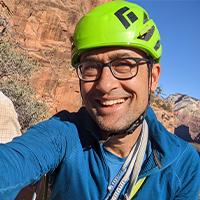Jesse Berwald | Principal Software Architect

Quantum Computing, Inc.
Remote (I currently reside in Minneapolis, Minnesota, U.S.)
Department: Engineering
Education: B.S. Honors Mathematics, University of Michigan, Ph.D. Mathematics, Montana State University
Career stage: Mid
What do you do?
As a software architect I interact closely with many levels of the organization. I ensure that hardware engineering projects align with requirements from sales and marketing. It is essential that the senior leadership understands the scope of a product and how to prioritize where we can take it. One example of a recent interesting project was we released a software interface to a new hardware device, which allows customers to solve integer optimization problems on a quantum computing device.
What types of skills do you use?
My foundational skills as a mathematician have allowed me to learn new skills such as quantum computing with minimal pain and suffering. Mathematicians are keen generalizers, which is an important crossover skill in many jobs, including software engineering. Project planning and management is foundational: decompose a six-month block of work into smaller milestones and deliverables. Nevertheless, most days require a much larger dose of interpersonal skill than any other skill.
How are applied mathematics and/or computational science important to what you do?
Applied mathematics and computer science are foundational to my work. Quantum computing leverages a wide range of tools, from machine learning to quantum physics. Staying abreast of new research means that I set aside time to read relevant research papers, too. Currently, architecting software for quantum computing involves a larger-than-average portion of the stack: at one end, an understanding of the underlying physics is often required; at the other end, one is tasked with implementing these ideas as machine learning algorithms in the cloud.
What are the pros and/or cons of your profession/job?
Pro: In my current role at a start-up, we are all focused on essentially a single product, which really helps to guide one’s work.
Con: Start-ups can travel a nonlinear path at times, which might involve a sudden change in the company’s direction, which can lead to feelings of instability.
Does your job offer flexibility?
My job is very flexible in terms of working hours and location.
What career path did you take to your current position?
My career path has been very nonlinear. I dropped out of high school to pursue bike racing and ended up finishing my last two years of undergrad at University of Michigan. The next five years included graduate school in Connecticut, a software position at IBM in Massachusetts, serving coffee, framing houses in Montana, and lots of rock and ice climbing. I reentered graduate school in Bozeman, Montana and graduated with a Ph.D. in mathematics.
After my Ph.D. I spent two years as a postdoc at William & Mary, then a year at the Institute for Mathematics and its Applications at University of Minnesota. Both of these postdocs focused on dynamical systems and topological data analysis. In 2014, I left academia for a data science position at Target, and after three years I transitioned to a sales engineer role at D-Wave, a quantum computing company in Vancouver, which ended up having many interesting collaborations with industrial partners. Now I work for a small start-up in the quantum computing realm, but have transitioned in this job from a quantum algorithm engineer to a software architect.
What advice would you give to someone pursuing a similar degree or profession?
Reach out to people you know in industry, pursue summer internships at national labs or companies, and learn to code in a modern language such as Python. The need for mathematical reasoning shows up in many unexpected areas.
Was there anything that surprised you when you started out in your career?
The number of people and technologies I regularly work with always impresses me. Developing a new product often involves much more work than a large journal paper.
Salary
$150K–$300K + bonus and stock options.
Back to List